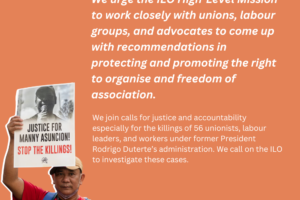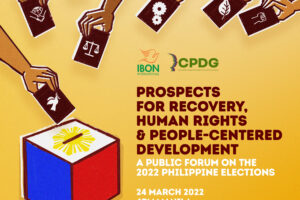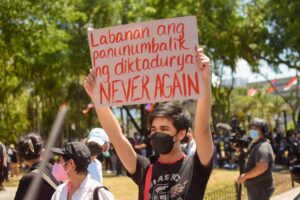IBON International welcomes the recent International Criminal Court (ICC) decision to continue the probe on former President Rodrigo Duterte’s “drug war” killings as an initial step toward accountability and justice. The ICC decision is the result of the painstaking efforts of victims’ families, people’s organisations, and civil society to hold perpetrators to account, amid the failure of domestic mechanisms and a prevailing culture of impunity in the country.
In light of Ferdinand Marcos Jr.’s State of the Nation Address, we further wish to draw the attention of the international community to the continuing killings and rights violations due to the current government’s counterinsurgency and counter-terrorism policies, which are systematically used against communities with land struggles. We are alarmed that these policies violently impose projects and policies that advance private interests, and violate people’s sovereignty and right to development.
Reports on new cases of rights violations reflect a continuity of the Duterte administration’s attacks on organisations struggling for peoples’ rights:
- On 14 June, a peasant family, including two minors, were killed by military forces in Himamaylan, Negros Occidental province in central Philippines. The case has been dubbed a massacre by social movements. Before the killings, the couple, Emelda and Bill Fausto, were branded by state actors as supporters of the New People’s Army, and experienced extensive harassment from the military. On June 25, the chairperson of the peasant organisation to which the Fausto couple belonged, Susan Medes of the Baclayan, Bito, Cabagal Farmers and Farmworkers Association (BABICAFA), was arrested on trumped-up charges.
- On 10 July, four Indigenous Peoples activists from the Cordillera region, northern Philippines, who have been resisting large-scale mining and mega-dam projects, were designated as terrorists under the 2020 Anti-Terror Act.
- On 12 July, farmer and community health worker Miguela Peniero and youth volunteer Rowena Dasig who were conducting research on the social impacts of a planned coal plant in Antimonan, Quezon Province were arrested by the military.
- In Isabela and Cagayan provinces, state counterinsurgency operations are bombing civilian communities and displacing them, in violation of international humanitarian law. Global campaign platform Silenced Suffering highlights the role of state actors in actively repressing the information about such violations against rural and Indigenous communities in the Philippines.
These cases of attacks happen under conditions of prevailing militarisation of rural communities in the country. The provinces of Negros Occidental and Oriental have been heavily occupied by police and military, with even more forces deployed since the previous administration’s Memorandum Order 30. Prior to the Fausto family’s massacre, joint police and military operations have killed multiple peasant activists and advocates in at least three cases, such as in Guihulngan in 2017, Sagay in 2018, and in the towns of Canlaon, Manjuyod, and Sta. Catalina in 2019.
Negros Occidental is also one of the key provinces for the World Bank-funded Support for the Parcelisation of Land for Individual Titling (SPLIT). Local peasant organisations report that the project is implemented in a militarised context. Moreover, peasant organisations have argued that the SPLIT’s aims, of breaking up into individual titles the collective peasants’ titles under the state land reform programme, render peasants and smallholder farmers vulnerable to corporate land grabs. They are also concerned about SPLIT’s adverse impacts on collective agricultural practices.
These killings reveal a common thread: the communities usually targeted are asserting their right to land against prevailing landlord and corporate exploitation, neoliberal land reform, and extractive projects. Amid Marcos Jr.’s push for the country’s full liberalisation for foreign investments in line with the neoliberal dictates of the International Monetary Fund and the World Bank Group, we are concerned that counterinsurgency and counterrorism policies will be further weaponised to facilitate corporate interests.
The continuation of the ICC probe shows the importance of international solidarity in chipping away at the culture of impunity. The year 2023 marks 75 years since the Universal Declaration on Human Rights; the Philippine case attests to the necessity of state accountability for the defense of civil and political, as well as social and economic rights.
IBON International calls on the international community to support people’s campaigns and calls to mobilise international mechanisms to investigate killings and human rights violations in the Philippines, in the context of the government’s counterinsurgency and counter-terrorism programs. #



![[WEBINAR] Seeking Accountability for Violations of Labour Rights in the Philippines](https://iboninternational.org/wp-content/uploads/2023/05/Flyer-Webinar-English-300x200.jpg)
